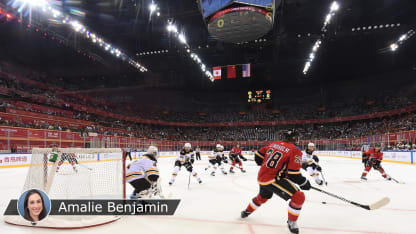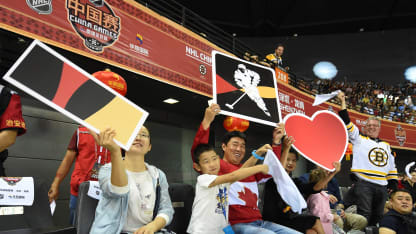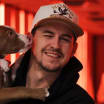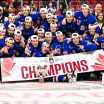It is slow going. But the NHL is prepared for that.
"You don't introduce a new sport to a country overnight," NHL Commissioner Gary Bettman said before the game. "You have to do it over the long term and that's what we're committed to. But based on all the feedback we've gotten and the meetings I've had over the last two days with our partners, they're thrilled with what they're seeing."
So were those in the stands.
There were oohs and aahs at the start, for a light show that would look at home at any NHL arena, especially in the Stanley Cup Playoffs. There was plenty of red, a color considered lucky in China, with fireballs of light blasting from center ice to the far reaches of the rink.
"If you saw the games last year, we spent a pretty good mix of trying to give them what a real NHL game looks like, but also having a Chinese historical bent to it," said David Proper, NHL executive vice president of media and international strategy. "The kids really were engaged by the NHL event. The music, the light shows and all that. I think at the end of the day it's all the same.
"I think that the same kids that get on the ice and love playing [are] just like the kids in North America. The same kids that are watching it from the stands and like the light show and [like to] watch the guys skate and the speed of the game and so forth. We didn't change that much presentation other than adding the Chinese element to it."
Some of that was gleaned from last preseason, when the Los Angeles Kings and Vancouver Canucks came to China for the first NHL games in the country. That served as a learning experience. They know more this year and will know more every year they return.
Because the idea is to get better at this, at all this. The NHL is committed to coming to China in four of the next six years. The League is expecting to open an office in China in the near future, perhaps by next summer. It will grow infrastructure and opportunities and the game's footprint.
"Any time you're doing business outside of North America, you've got to figure out how you're going to have a presence there and I think having an office, particularly when it's 8,000 miles away and 12 time zones, you've got to figure out how to be on the ground," Proper said.
"Ideally the next six months is when we would try to get that done, at least open something."



















